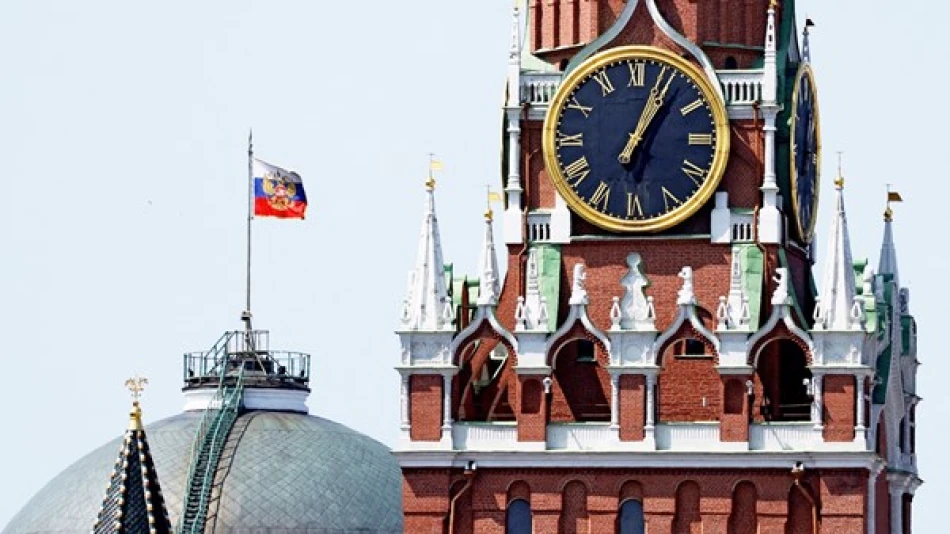
Kremlin: No Breakthrough Expected in Ukraine Negotiations
Russia Dampens Expectations Ahead of Istanbul Peace Talks Despite Trump's 50-Day Ultimatum
The Kremlin has signaled minimal optimism for breakthrough progress in Wednesday's Russia-Ukraine negotiations in Istanbul, maintaining its hardline stance despite mounting pressure from President Donald Trump's 50-day deadline for a peace deal. Moscow's tempered expectations suggest the diplomatic process may face significant hurdles, even as both sides prepare for their third round of direct talks since the conflict began in February 2022.
Trump's Diplomatic Gambit Meets Russian Resistance
The upcoming Istanbul talks represent a critical test of Trump's negotiating leverage over Moscow. The U.S. president's ultimatum—demanding a resolution within 50 days or facing severe sanctions—has injected urgency into diplomatic efforts that have previously yielded little concrete progress. However, Russia's public messaging suggests it remains unwilling to compromise on what it considers core objectives.
Kremlin spokesperson Dmitry Peskov made clear Tuesday that Moscow sees no reason for optimism, stating: "There is naturally no reason to expect any major breakthrough, but we intend to defend our interests and implement the tasks we set from the beginning." This language mirrors Russia's consistent position throughout nearly three years of conflict, indicating that external pressure may not be sufficient to shift fundamental negotiating positions.
Negotiating Teams Signal Diplomatic Hierarchy
The composition of both delegations reveals telling insights about each side's approach to the talks. Ukraine's team will again be led by former Defense Minister Rustem Umerov, signaling Kyiv's serious engagement with the process. In contrast, Russia's previous reliance on former Culture Minister and historian Vladimir Medinsky to head negotiations has drawn Ukrainian criticism, potentially reflecting Moscow's view of these talks as more performative than substantive.
Russia's delay in announcing its delegation composition, compared to Ukraine's prompt disclosure, may indicate internal deliberations about the appropriate level of representation—a common diplomatic signal about commitment levels.
Historical Context and Precedent
These talks occur against the backdrop of multiple failed diplomatic initiatives since Russia's February 2022 invasion. Previous rounds in Belarus and Turkey produced temporary agreements that quickly collapsed, most notably the grain export deal that Moscow later abandoned. This history of broken commitments has created deep skepticism about Russia's negotiating intentions.
The choice of Istanbul as a venue carries symbolic weight, given Turkey's role as a NATO member that has maintained diplomatic relations with both parties. Turkish President Erdogan's mediation efforts have previously yielded limited success, but Turkey's unique position as a bridge between East and West makes it one of the few remaining viable neutral venues.
Market and Strategic Implications
Financial markets will likely remain cautious despite the renewed diplomatic activity. Previous negotiation rounds have produced brief rallies in risk assets and declines in energy prices, only to reverse when talks stalled. The Kremlin's pre-emptive dampening of expectations suggests investors should prepare for continued volatility rather than sustained relief.
For European energy markets, any genuine progress could signal potential changes to sanctions regimes and supply arrangements. However, Russia's stated commitment to its "fundamental conditions"—likely including territorial concessions and neutrality guarantees—suggests structural factors driving energy prices may persist regardless of diplomatic theater.
The Path Forward Remains Unclear
Peskov's assertion that "much work needs to be done" before any potential Putin-Zelensky summit reflects the substantial gap between current positions and any viable agreement. Russia's emphasis on defending its interests while Ukraine maintains its territorial integrity demands suggests the fundamental incompatibility that has defined this conflict remains unchanged.
The 50-day timeline imposed by Trump creates artificial urgency, but diplomatic breakthroughs rarely conform to external deadlines. More likely, these talks will serve as another measure of how entrenched positions have become, potentially setting the stage for either escalated pressure or recognition that current diplomatic frameworks remain insufficient for resolution.
Most Viewed News

 Layla Al Mansoori
Layla Al Mansoori






